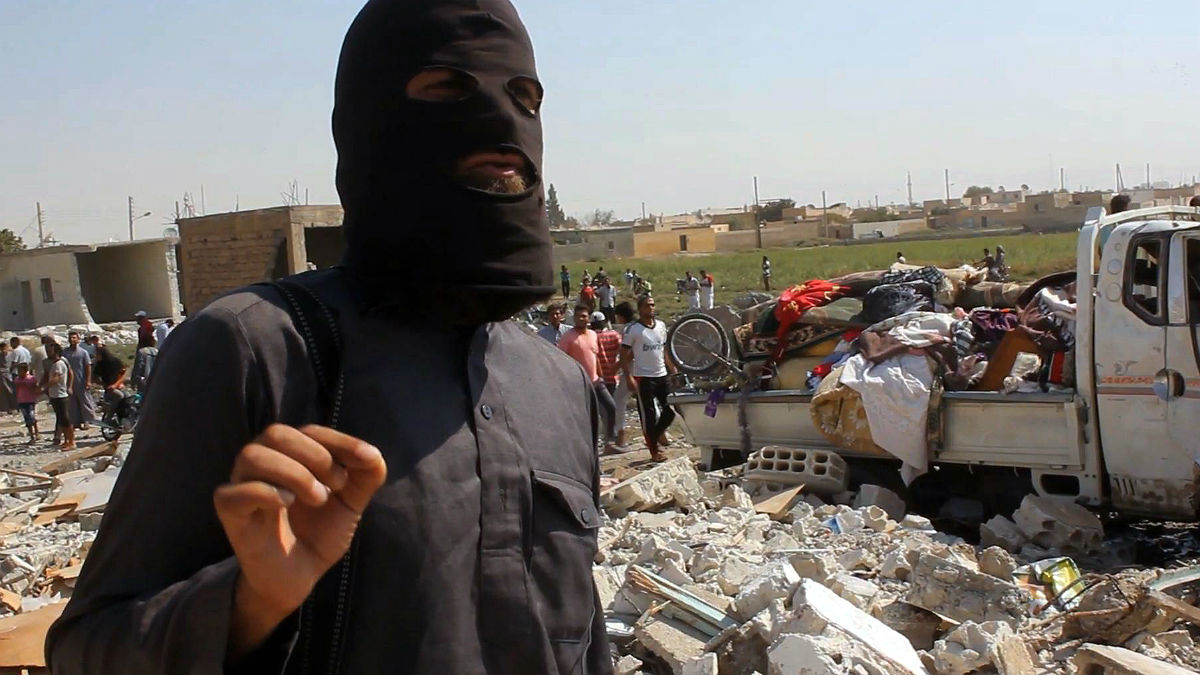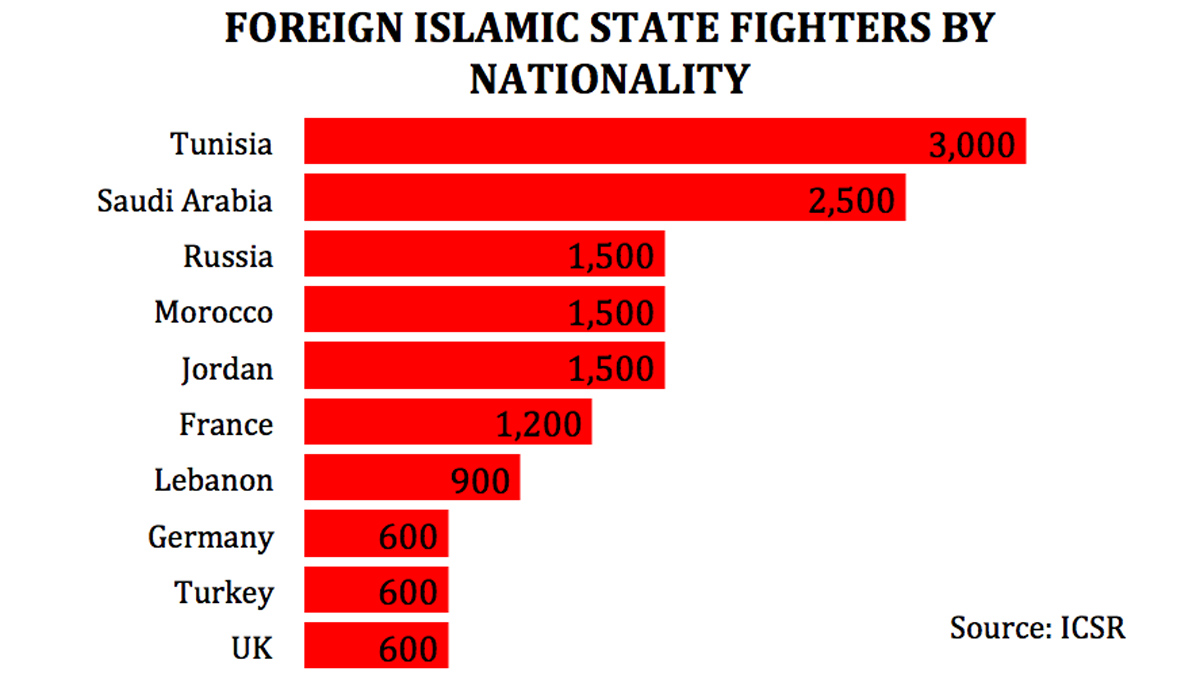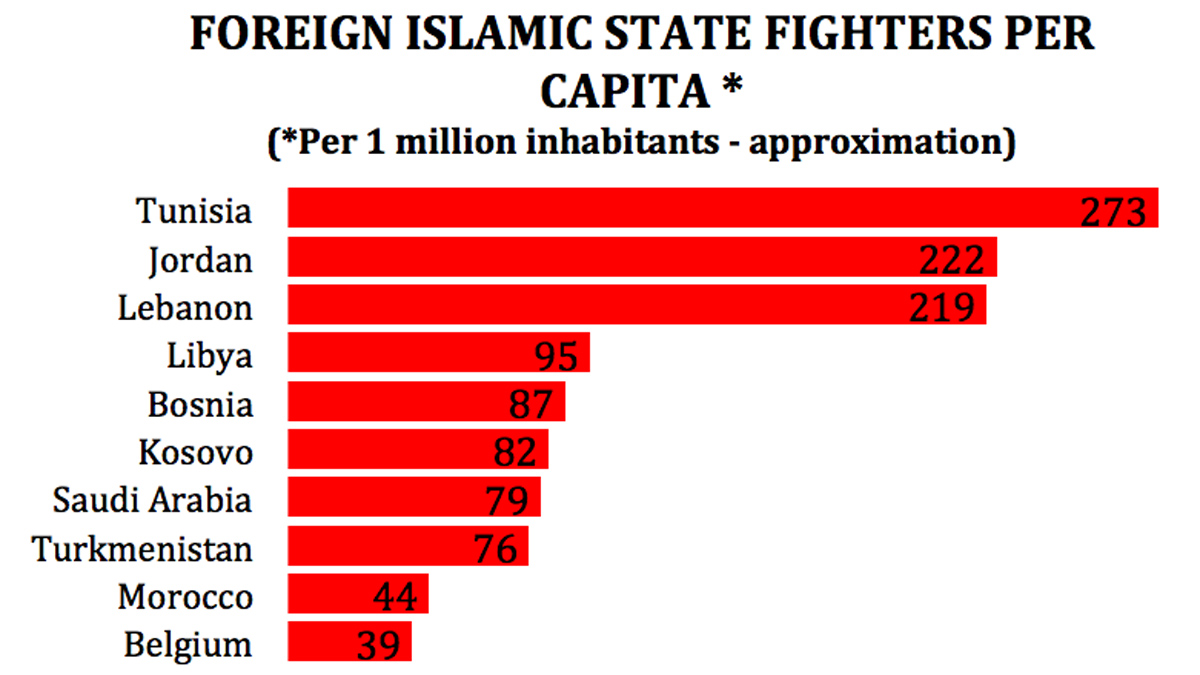How many foreign fighters have joined Islamic State?
International governments struggle to control the flow of volunteers to Iraq and Syria

A free daily email with the biggest news stories of the day – and the best features from TheWeek.com
You are now subscribed
Your newsletter sign-up was successful
Abdul Waheed Majid, Ibrahim al-Mazwagi, and Abu Abdel Malik al-Britani are just three of the estimated 500 – 600 British men who have travelled to Iraq and Syria to join the Islamic State since the Syrian civil war broke out in 2011.
Although their cases provoked headlines and hand-wringing, many others have gone unreported. Nor is Britain alone in having seen its citizens travel to the region. According to international monitors, tens of thousands of people have travelled from all over the world to join the conflict.
The Week
Escape your echo chamber. Get the facts behind the news, plus analysis from multiple perspectives.

Sign up for The Week's Free Newsletters
From our morning news briefing to a weekly Good News Newsletter, get the best of The Week delivered directly to your inbox.
From our morning news briefing to a weekly Good News Newsletter, get the best of The Week delivered directly to your inbox.
In fact, more foreign nationals have travelled to the region than the number of international volunteers who fought in recent conflicts in Afghanistan, Pakistan, Iraq, Yemen and Somalia.
Of course, there’s nothing new about people joining overseas battles for ideological reasons – countless fighters from all over the world joined the International Brigades fighting Franco in Spain in the late 1930s, for example. But what is remarkable about the conflict in Syria and Iraq is that it already appears to have attracted more foreign volunteers than any war since 1945, according to the International Centre for the Study of Radicalisation (ICSR),
Still, IS's foreign contingent should not be overestimated, the organisation says. According to the ICSR, international recruits account for less than 10 per cent of the Islamic State's current fighting force, which numbers just slightly more than 100,000 men.
Over the course of the conflict, a total of 20,730 foreign fighters are thought to have joined IS's ranks, but this figure includes those who have subsequently returned home, been killed in the fighting, or been arrested.
A free daily email with the biggest news stories of the day – and the best features from TheWeek.com
So where are they coming from?

Unsurprisingly, most IS volunteers come from countries in the region like Tunisia, Saudi Arabia and Jordan. Russia has also contributed a substantial number of fighters – with most believed to have come from Chechnya.
The Middle East is the biggest provider of fighters by far with 11,000, and another 3,000 come from former Soviet states.
But if we factor in the population of the country of origin we see some interesting results:

Per capita, Tunisia, Jordan and Lebanon contribute the most fighters of all. But as can be seen in the chart above, Belgium's contribution is also significant. The European Union’s counter-terrorism coordinator has flagged up the fact that Belgium has contributed more foreign fighters to Syria and Iraq per head of population than any other EU country.
The EU has also expressed concern that many Belgian residents who have returned to the country after fighting in the region are not being properly monitored by Belgium's security services.
The return of foreign fighters is an increasing problem for many countries in the EU. Academics believe that one third (7,000 roughly) of foreign nationals who volunteered to fight in Syria and Iraq may have already returned home.
In the UK, home secretary Theresa May has stepped up the use of powers to strip jihadists of their British citizenship, while Denmark has opted to try to rehabilitate its returning fighters. But in spite of international government efforts to stem the flow of volunteers to the region, the number of foreign fighters continues to rise.
-
 How the FCC’s ‘equal time’ rule works
How the FCC’s ‘equal time’ rule worksIn the Spotlight The law is at the heart of the Colbert-CBS conflict
-
 What is the endgame in the DHS shutdown?
What is the endgame in the DHS shutdown?Today’s Big Question Democrats want to rein in ICE’s immigration crackdown
-
 ‘Poor time management isn’t just an inconvenience’
‘Poor time management isn’t just an inconvenience’Instant Opinion Opinion, comment and editorials of the day
-
 Epstein files topple law CEO, roil UK government
Epstein files topple law CEO, roil UK governmentSpeed Read Peter Mandelson, Britain’s former ambassador to the US, is caught up in the scandal
-
 Iran and US prepare to meet after skirmishes
Iran and US prepare to meet after skirmishesSpeed Read The incident comes amid heightened tensions in the Middle East
-
 Syria’s Kurds: abandoned by their US ally
Syria’s Kurds: abandoned by their US allyTalking Point Ahmed al-Sharaa’s lightning offensive against Syrian Kurdistan belies his promise to respect the country’s ethnic minorities
-
 Israel retrieves final hostage’s body from Gaza
Israel retrieves final hostage’s body from GazaSpeed Read The 24-year-old police officer was killed during the initial Hamas attack
-
 China’s Xi targets top general in growing purge
China’s Xi targets top general in growing purgeSpeed Read Zhang Youxia is being investigated over ‘grave violations’ of the law
-
 Syria’s Islamic State problem
Syria’s Islamic State problemIn The Spotlight Fragile security in prison camps leads to escape of IS fighters
-
 Panama and Canada are negotiating over a crucial copper mine
Panama and Canada are negotiating over a crucial copper mineIn the Spotlight Panama is set to make a final decision on the mine this summer
-
 Why Greenland’s natural resources are nearly impossible to mine
Why Greenland’s natural resources are nearly impossible to mineThe Explainer The country’s natural landscape makes the task extremely difficult